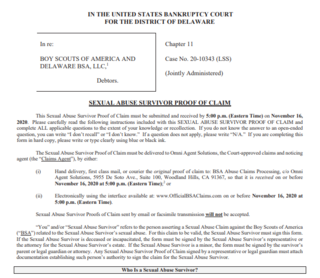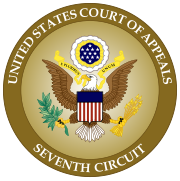
Scouting, also known as the Scout Movement, is a worldwide youth movement employing the Scout method, a program of informal education with an emphasis on practical outdoor activities, including camping, woodcraft, aquatics, hiking, backpacking, and sports. Another widely recognized movement characteristic is the Scout uniform, by intent hiding all differences of social standing in a country and making for equality, with neckerchief and campaign hat or comparable headwear. Distinctive uniform insignia include the fleur-de-lis and the trefoil, as well as merit badges and other patches.

The Boy Scouts of America is one of the largest scouting organizations and one of the largest youth organizations in the United States, with about 1.2 million youth participants. The BSA was founded in 1910, and since then, about 110 million Americans have participated in BSA programs. BSA is part of the international Scout Movement and became a founding member organization of the World Organization of the Scout Movement in 1922.

Eagle Scout is the highest achievement or rank attainable in the Scouts BSA program of the Boy Scouts of America (BSA). Since its inception in 1911, only four percent of Scouts have earned this rank after a lengthy review process. The Eagle Scout rank has been earned by over 2.5 million youth.
Advancement and recognition in the Boy Scouts of America is a tradition dating from the inception of the Scouting movement. A fundamental purpose of advancement is the self-confidence a young man or woman acquires from his participation in Scouting. Advancement is one of the methods used in the "Aims of Scouting"– character development, citizenship training and personal fitness.

The Boy Scouts of the Philippines (BSP) is the national scouting organization of the Philippines in the World Organization of the Scout Movement. The Scout movement was first introduced in the Philippines on 1910 during the American Colonial Rule. It was "granted Recognition as a Member Organisation of the Boy Scouts International Conference...with effect from October 31, 1936" by virtue of certification signed by J. S. Wilson, Olave Baden-Powell, and Daniel Spry.

The National Scout jamboree is a gathering, or jamboree, of thousands of members of the Boy Scouts of America, usually held every four years and organized by the National Council of the Boy Scouts of America. Referred to as "the Jamboree", "Jambo", or NSJ, Scouts from all over the nation and world have the opportunity to attend. They are considered to be one of several unique experiences that the Boy Scouts of America offers. The first jamboree was scheduled to be held in 1935 in Washington, D.C. to celebrate the 25th anniversary of Scouting, but was delayed two years after being cancelled due to a polio outbreak. The 1937 jamboree in Washington attracted 25,000 Scouts, who camped around the Washington Monument and Tidal Basin. The event was covered extensively by national media and attended by President Franklin D. Roosevelt.

Sea Scouts is a program of the Boy Scouts of America for young men and women ages 14 through 20.

Fort A.P. Hill is a training and maneuver center belonging to the United States Army located near the town of Bowling Green, Virginia. The center focuses on arms training and is used by all branches of the US Armed Forces. It is named for Virginia native and Confederate Lieutenant General A. P. Hill. Fort A.P. Hill is one of the U.S. Army installations named for Confederate soldiers to be renamed by the Commission on the Naming of Items of the Department of Defense that Commemorate the Confederate States of America or Any Person Who Served Voluntarily with the Confederate States of America.

Edward Urner Goodman was an influential leader in the Boy Scouts of America (BSA) movement for much of the twentieth century. Goodman was the national program director from 1931 until 1951, during the organization's formative years of significant growth when the Cub Scouting and Exploring programs were established. He developed the BSA's national training center in the early 1930s and was responsible for publication of the widely read Boy Scout Handbook and other Scouting books, writing the Leaders Handbook used by Scout leaders in the United States during the 1930s and 1940s. In the 1950s, Goodman was Executive Director of Men's Work for the National Council of Churches in New York City and active in church work.
The Boy Scouts of America (BSA), one of the largest private youth organizations in the United States, has policies which prohibit those who are not willing to subscribe to the BSA's Declaration of Religious Principle, which is usually interpreted as banning atheists, and, until January 2014, prohibited all "known or avowed homosexuals", from membership in its Scouting program. The ban on adults who are "open or avowed homosexuals" from leadership positions was lifted in July 2015. Prior to these policy changes, BSA had denied or revoked membership status or leadership positions for violation of these foundational principles. The BSA had contended that its policies were essential in its mission to instill in young people the values of the Scout Promise, or Oath, and Scout Law.

William Hillcourt, known within the Scouting movement as "Green Bar Bill", was an influential leader in the Boy Scouts of America (BSA) organization from 1927 to 1992. Hillcourt was a prolific writer and teacher in the areas of woodcraft, troop and patrol structure, and training; his written works include three editions of the BSA's official Boy Scout Handbook, with over 12.6 million copies printed, other Scouting-related books and numerous magazine articles. Hillcourt developed and promoted the American adaptation of the Wood Badge adult Scout leader training program.

James Edward West was a lawyer and an advocate of children's rights, who became the first professional Executive Secretary, soon renamed Chief Scout Executive, of the Boy Scouts of America (BSA), serving from 1911 to 1943. Upon his retirement from the BSA, West was given the title of Chief Scout.
Randall v. Orange County Council, 17 Cal.4th 736, 952 P.2d 261, 72 Cal.Rptr.2d 453 (1998), was a case before the Supreme Court of California that established that groups such as the Boy Scouts of America are not considered "business establishments" as used in the state's Unruh Civil Rights Act and could not be subject to its provisions. Its companion case was Curran v. Mount Diablo Council of the Boy Scouts of America, 17 Cal.4th 670, 952 P.2d 218, 72 Cal.Rptr.2d 410 (1998).

The Support Our Scouts Act of 2005 was passed as part of the Department of Defense Appropriations Act, 2006 to prevent Local, State and Federal agencies from reducing their support for the Boy Scouts of America. The bill was passed in the wake of a number of controversies involving the Boy Scouts of America, such as their exclusion of gays and atheists, and subsequent attempts to limit government support of the organization.

Scouts BSA is the flagship membership level of the Boy Scouts of America (BSA) for boys and girls between the ages of typically 11 and 17. It provides youth training in character, citizenship, and mental and personal fitness. Scouts are expected to develop personal religious values, learn the principles of American heritage and government, and acquire skills to become successful adults.

Barnes-Wallace v. Boy Scouts of America was a case involving the City of San Diego's relationship with the Boy Scouts of America.
Evans v. Berkeley was a court case which upheld the right of governmental entities in California to withhold support from non-profit organizations that practice discrimination on the basis of sexual orientation.

The Boy Scouts of America (BSA) was inspired by and modeled on The Boy Scouts Association, established by Robert Baden-Powell in Britain in 1910. In the early 1900s, several youth organizations were active, and many became part of the BSA.
The Summit Bechtel Family National Scout Reserve, often shortened as Summit Bechtel Reserve (SBR), located in Fayette and Raleigh counties, near Beckley, West Virginia, is one of four facilities managed by the National Council of the Boy Scouts of America (BSA). The others are Philmont Scout Ranch in New Mexico, Northern Tier National High Adventure Bases in Minnesota, as well as Manitoba and Ontario in Canada, and Florida National High Adventure Sea Base in the Keys. The Summit Bechtel Reserve is the current home of the National Scout Jamboree, the Paul R. Christen National High Adventure Base, the James C. Justice National Scout Camp, and the John D. Tickle National Training and Leadership Center. The reserve comprises properties totaling over 14,000 acres (57 km2). The facility's opening event was the 2013 National Scout Jamboree.

The Boy Scouts of America (BSA) is one of the largest youth organizations in the United States, with 2.3 million youth members and approximately 889,000 adult volunteers. In 1979 there were over 5 million youths in BSA.














